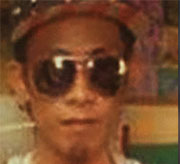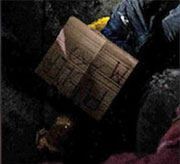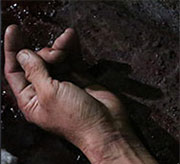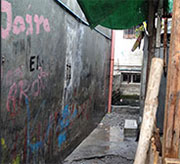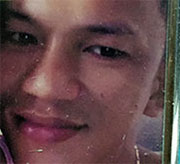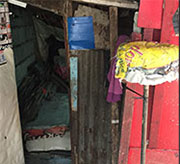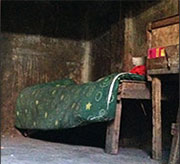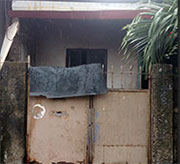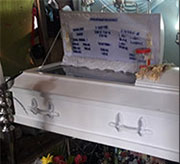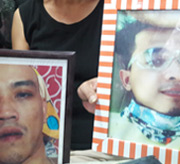
Editor's note: This six-part series by the ABS-CBN Investigative
and Research Group won the Excellence in Human Rights Reporting at the Society of Publishers in Asia's
2017 Awards for Editorial Excellence.
Read: ABS-CBN report on drug war victims wins plum Asia journalism prize
'They didn't give my husband chance to air his side'
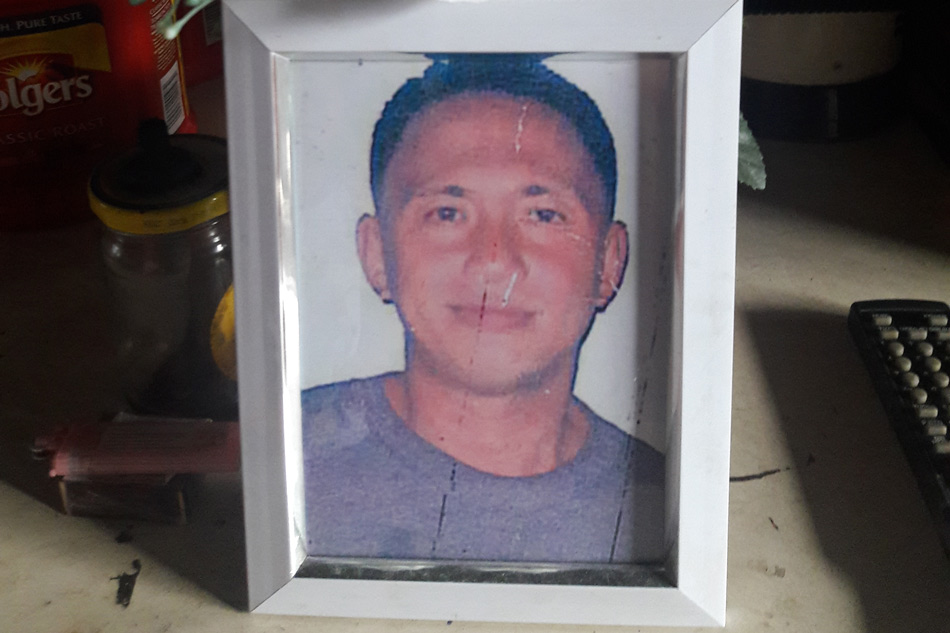
COMING home from work one day in July 2016 in Southville Niugan in Cabuyao City, Laguna, she was met by her son who anxiously told her: “Mama, si Papa sumakay ng kotse.”
It would not have worried her except that several hours had passed and her husband Ricardo had not come home. In an earlier text to his brother, Ricardo said he left for a while to accompany someone for an errand.
She looked around for her husband all night until dawn. With her brother-in-law, she went to police stations and funeral homes but no one had seen her 42-year-old husband.
She returned home to attend to their five children.
Later in the afternoon, her brother-in-law received a text from a funeral service in Cabuyao: A man was found dead in a nearby barangay and the body had been brought to another funeral home in Calamba.
It was Ricardo, the most tragic news she ever heard in her life. Her husband is dead. He was slain.
Until now, Gina does not know what really happened to Ricardo. Who killed him--and why?
Some people said they saw an unmarked grey sedan pick up Ricardo from their house. There were two men in the car. One of them was a known police asset nicknamed Elvis.
Another witness told her Ricardo was seen running along the docks before he was shot dead by policemen no less.
Later in the afternoon, her brother-in-law received a text from a funeral service in Cabuyao: A man was found dead in a nearby barangay and the body had been brought to another funeral home in Calamba.
The funeral issued a death certificate showing Ricardo suffered gunshot wounds on his trunk. But he also had wounds in his right thigh, upper abdomen, chest, and nape, his brother said.
A police report later showed the police tried to arrest Ricardo in a buy-bust operation, but he resisted arrest, forcing the police to shoot him. He died at once.
According to a barangay official, Ricardo had been involved in drugs. He had no permanent job.
His wife denied the allegations, saying he had tried his best to earn by taking jobs as a porter, laborer and construction worker. Too bad, Ricardo was no longer around to say his piece, she said. - Juni Gonzales, Rachel Cantuba, John de Lima
‘Dodong was a pusher all right, but...’
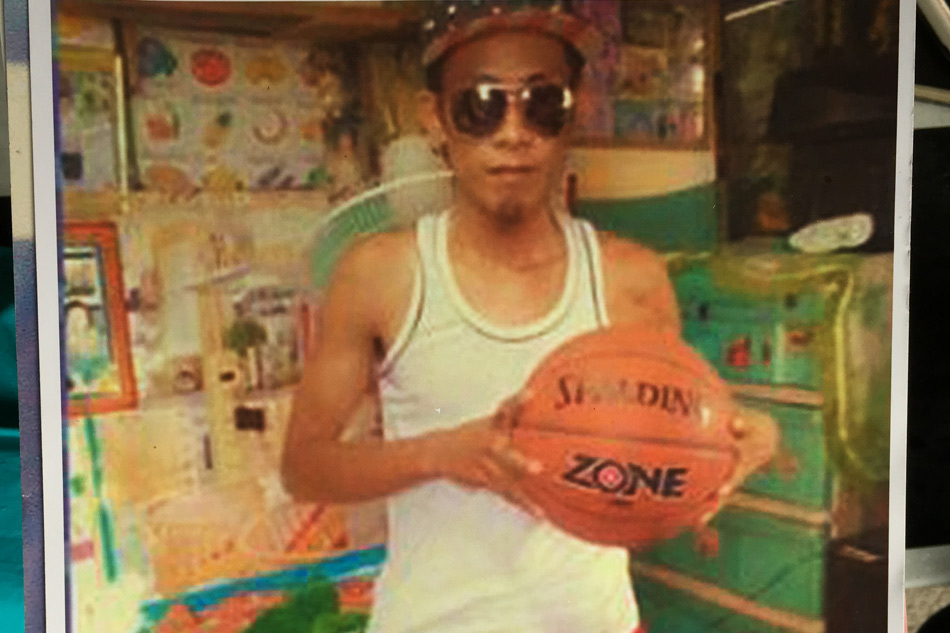
HE WAS last seen alive with a team of policemen one afternoon in July in front of his house in Lupang Arenda in Sta. Ana, Taytay, Rizal; his hands behind his back, apparently tied or in handcuffs. He died several hours later inside the house.
His family and neighbors said Rio Awa, or Dodong as he was fondly called, was involved in illegal drug activities and that he owned a gun to protect himself.
But must his life end this way? His sister Marianne asked, recalling how his 28-year-old brother lived and he died.
Marianne said Dodong, a father of a four-year-old boy, was a construction worker but he had to stop due to an operation. In deep predicament to make both ends meet, he sold prohibited drugs.
The day he died, he was at home, but in police custody, the sister said. Police accosted him and brought him back to his house.
Curious, the neighbors gathered around near his house. More men came, some in police uniform and some in civilian clothes. The law enforcers told all the neighbors to stay in their houses and away from harm’s way.
A few minutes later, the neighbors heard gunshots.
A police official reported later that Dodong was a suspected drug pusher. There was a drug buy-bust operation, and Dodong attempted to shoot the poseur buyer but he missed, the official said.
That was when the law enforcers fired back, killing him instantly.
"Paano yun nanlaban eh kitang kita namin dito nakaposas?” a neighbor asked.
Dodong’s wife is pregnant with their second child. — Ana Maria Reyes, Jhoanna Ballaran
‘They got the wrong man’
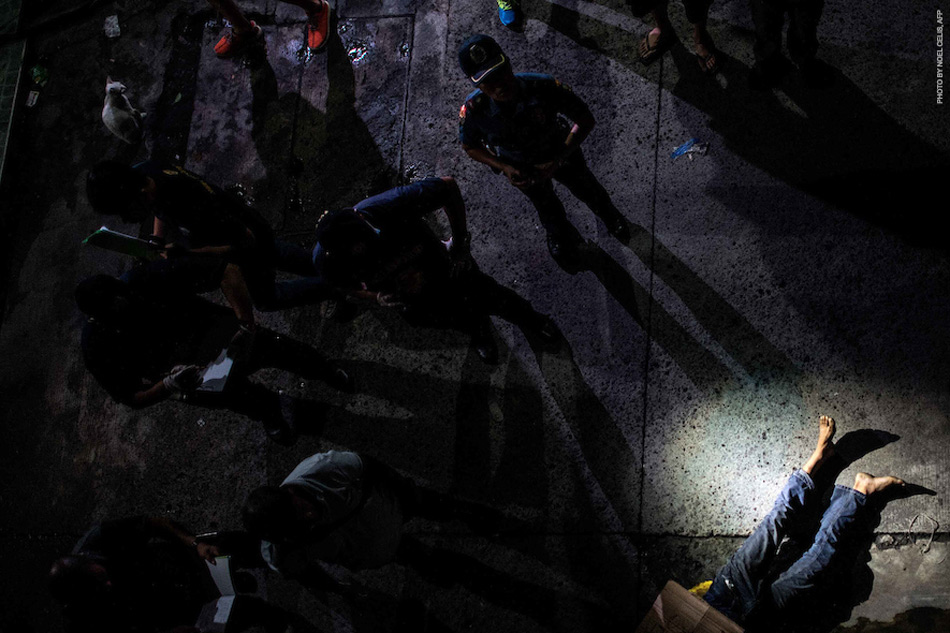
CHARLENE waited for her mother and stepfather Edgar who were coming to her place on Geronimo Street in Sampaloc, Manila for a visit one afternoon in July. He had promised her to set-up an internet shop she would name Piso Net to earn extra income for the family.
He showed up and while in Sampaloc, Edgar tried to fix his motorbike when two policemen approached him and asked why he was half naked. The two proceeded to search him but did not find any illegal drugs or weapons.
Not content, they brought Edgar to the Lacson Police Community Precinct.
Charlene and her mother followed Edgar to the precinct to speak with the arresting officers. She was surprised when she found out they wanted to slap him with possession of illegal drugs and a grenade.
The police told mother and daughter to go home and come back with food and clothes for him.
It was to be the last time they would see Edgar alive.
Said Charlene: “Nandun siya sa ano sa upuan, nakita ko, nakaganyan, may posas siya.”
They went back to the precinct and spoke with the police as to how much it would take for Edgar to get his freedom back—the amount ranged first from P120,000 and later, with the help of the barangay chairman, to P10,000. They did not allow them to see him.
“Wala namang damit, wala namang may nakuha. Sabi kasi ang kaso niya daw kuno shabu atsaka granada. Ang ano daw doon P120,000 ang dapat piyansa doon,” she said.
“Sabi ko wala naman po kaming ganoong pera tapos isa pa, wala naman pong nakuha dyan na ganyan, shabu atsaka granada. Huling nakahubad lang naman,” she added.
But the police refused to accept P10,000 only. And so, they went back home to look for more money and other things that they could sell to the pawnshop.
When they came back, they found a patrol car parked in front of the Ospital ng Tondo, just across the barangay hall. They turned red and fidgety.
Edgar was dead, they were told.
According to a police report, his stepfather was released from his handcuffs when he was granted permission to go to the bathroom. He reportedly grabbed the service gun of his police escort, causing a commotion, which prompted another police to shoot him. The report said the police found two sachets of shabu from him.
The barangay chairman said that Edgar was not among the drug users and pushers who surrendered during the implementation of the Opla Tokhang because he was not a resident of the barangay.
Charlene said his stepfather was a full-time barangay tanod in Sucat and that he was not involved in illegal drug activities. – Juni Gonzales
`We asked him to avoid drugs’
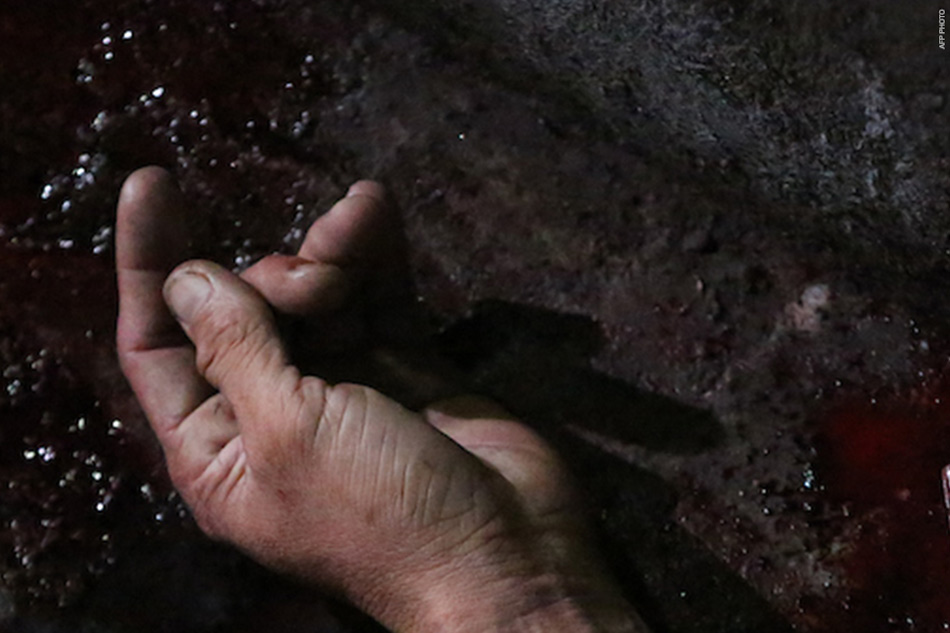
ON THE NIGHT of June 14, Ronilo talked to his partner, Jenny about his plan on coming clean to the police with his involvement to illegal drugs.
Before leaving the house, Jenny checked Ronilo’s pockets because she was asking him for money to buy some food for their children. She got nothing.
The following day, Jenny heard the news that Ronilo was killed in a vacant lot just few blocks from their house in Barangay Biclatan, General Trias in Cavite. He suffered not less than 10 gunshots including one in the head, she was told.
A neighbor said Ronilo was last seen talking to some people in the same vacant lot where he was killed.
A police report said the General Trias City Anti-Illegal Drugs Special Operations Task Group had conducted a drug buy-bust operation targeting Ronilo. He was listed as top drug personality in General Trias City and was also previously arrested for drugs.
The police report said that Ronilo exchanged fire with the operatives and was thus fired upon. He was brought to a nearby hospital but was declared dead on arrival.
Jenny said that Ronilo was indeed arrested in 2015. He was released on bail after three months. Free as a bird, he continued his illegal activities, she said.
“Noong nakita namin na may barka-barkada at ginagabi siya lagi, sabi ko ‘baka nagddrugs ka na naman, iwasan mo.’ Maawa ka na lang sa amin ng anak mo kung ayaw mong magbago’,” she recalled telling him.
In December 2015, Jenny said she kicked him out of the house because she was worried about their safety since Ronilo wouldn’t stop his illegal activities.
He had been invited to surrender at the barangay but he refused because he believed that the people in the barangay were also involved to illegal drugs.
Ronilo left behind six children aged 18, 17, 15, 11, 10, and five. – Ana Maria Reyes
‘He couldn’t afford to buy a gun’
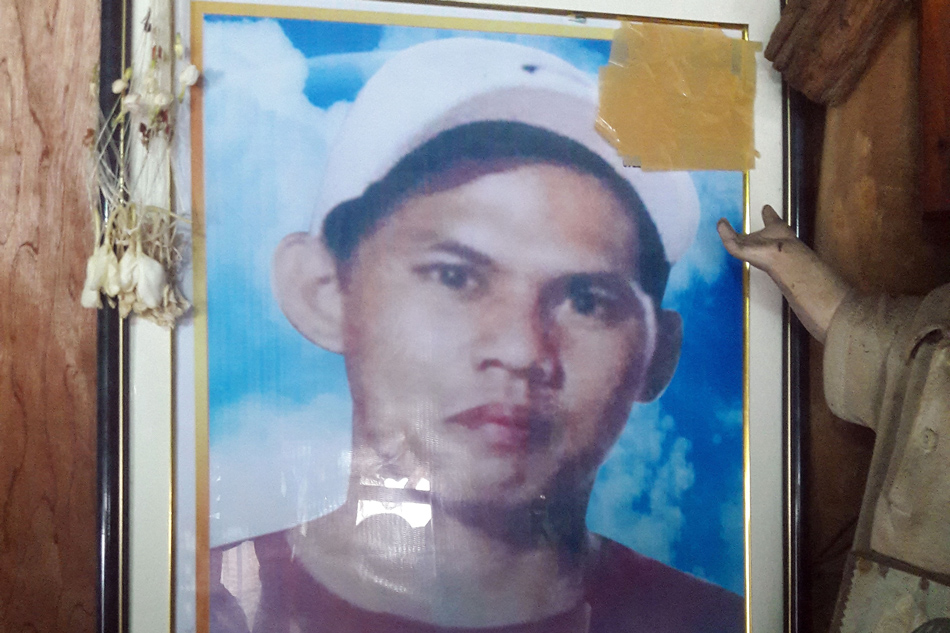
THEY suddenly barged into the house of Napoleon Miras Ay-Ay, shouting and ordering everyone to lie face down in Barangay Antipona in Bocaue, Bulacan.
Operatives of the Bocaue police and PDEA were looking for 27-year-old Napoleon, or Nono, a suspected seller of prohibited drugs. His house was one of the many shanties in the cavernous compound in the barangay.
Out of fear, Nono’s 52-year-old mother Edeltruda, who was standing by the entrance, stepped out and into a neighbor’s house.
Nono’s father Eustaquio, 60, told his son to surrender to the police. Nono instead ducked himself at a corner of the house by the river.
“Nagtatago na siya diyan e,” Eustaquio said. “Sabi ko tara na kako anak, sumama ka na kako sa kanila. Edi nandito ako, inakay ko siya dito."
Eustaquio begged the police not to hurt Nono because he was only driving for the actual pusher, Eunice Zapra Ripia who had been arrested by the police.
“Service lang siya talaga e,” he said. “Service lang siya sa tricycle. Inuupa siya noong babae na P300 kada biyahe.”
The police saw Nono and brought him upstairs. Within a couple of minutes, they heard gunshots. When the police went down, they broke the news: Nono was dead.
"Sabi ko, ‘Sir kako, ano na po nangyari sa kay Nono ko?’” Eustaquio asked. “‘Nandoon eka, nanlaban e, patay na.”
But the parents said that Nono didn’t resist arrest.
“Paano lalaban ang anak ko e dito pa lang e putlang putla na yung anak ko,” Eustaquio said.
According to a report, police recovered one .38-caliber revolver and sachets containing shabu from the house.
Edeltruda said her son didn’t have a gun. “Wala po 'yon! Pinalabas lang may .38. Pagkain nga lang namin tingnan mo naman ang itsura, ito ba makakabili ng .38 ang anak ko?” she said.
Edeltruda said it would have been better if Nono were just imprisoned.
“Bakit kasi pinatay nila? Sana kinulong na lang,, madadalaw ko yung anak ko," she said.
Nono’s death left the family devastated. – Rizza Cervantes
‘They left gun on right hand of left-handed’
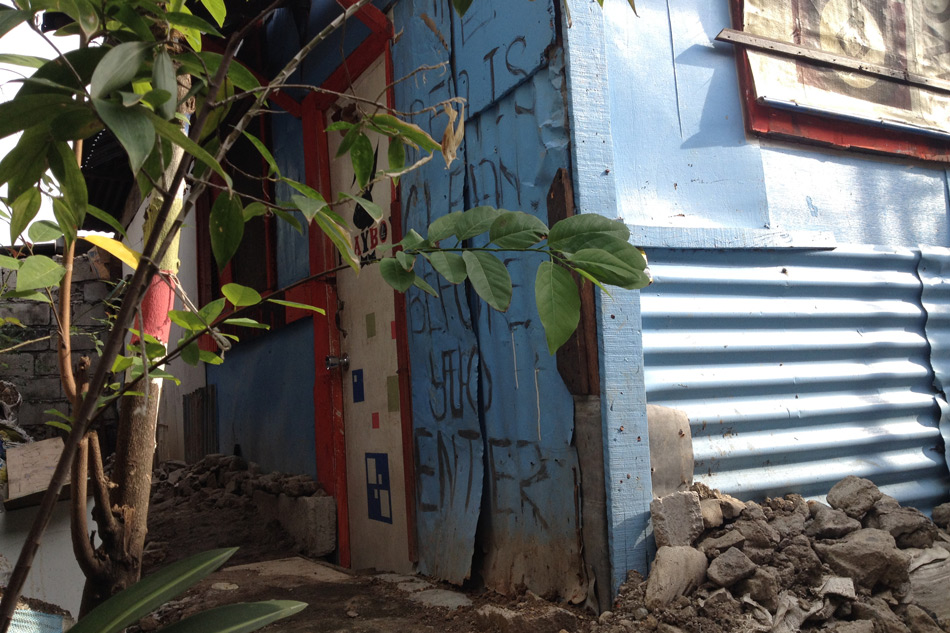
DERNLY BATALAN, a 27-year-old part-time construction worker, had to call his engineer he couldn’t report for work one morning in July. He was at home in Barangay Western Bicutan in Taguig City. He was not feeling well.
By the time he was ready for lunch, some Taguig police and barangay officers arrived to conduct “Oplan Tokhang”, catching Batalan and his family by surprise.
"Dapa, dapa, dapa! Pulis to!" Dernly’s sister recalled hearing the operatives shouting. In no time, they were kicking Dernly’s door.
It was clear: They were after him. Dernly had a previous brush with the law. Last year, he was released from a three-year detention for possession of marijuana.
The police ordered everybody in the neighborhood to close their doors and windows to keep them out of harm’s way. The suspect might fire at the operatives, the neighbors were told.
Standing next door watching, Dernly’s sister said she heard her brother shouting for help: "Uncle, Uncle, tulungan nyo ako!"
But the police didn’t listen to him, she said.
“’Di ba po pag sinabing ‘tulong’ di naman nanlalaban yun e? Tsaka parang umiiyak si kuya noon. Alam n’yo naman po yung boses ng umiiyak habang humihingi ng tulong,” she said.
After three gunshots, she said she overheard the police talking about checking Dernly’s eyes, probably to check if her brother was dead. He was. His body suffered two gunshot wounds: two in his trunk and another in the head.
“[Tapos] parang may tinawagan sila…yun pala…patay na pala.”
A police report later said the operatives had recovered .45-caliber Colt MK IV, an empty magazine of caliber .45, empty shells of .45 and 9mm caliber, an improvised shotgun or sumpak loaded with 12 gauge live ammunition, and four sachets of suspected shabu.
Dernly’s sister said the alleged pieces of evidence found were questionable. But she said her brother did make a sumpak.
“Eto po ang mali dun: kaliwete po yung kuya ko, kanan po nila nilagay yung baril,” she said.
After the killing, she said authorities simply walked away without a word, except to say he was on the police watch list of men allegedly involved in drugs.
But they were not shown of any document, she said. Not even a warrant.
“Sa programang Oplan Tokhang ni Mayor Lani at ni Kapitan Supan… Pinapasuko ang mga adik dito sa Taguig.’ ‘Yun siguro hindi pinansin ni kuya. Pero hindi po doon mini-mention ‘yung pangalan ni kuya. Hindi po!”
“Di po tama yung ginawa ng mga [pulis],” she said. “San po kayo nakakita ng nanlalaban pero humihingi ng tulong?” she asked. – Yssa Española
‘They left gun on right hand of left-handed’

DERNLY BATALAN, a 27-year-old part-time construction worker, had to call his engineer he couldn’t report for work one morning in July. He was at home in Barangay Western Bicutan in Taguig City. He was not feeling well.
By the time he was ready for lunch, some Taguig police and barangay officers arrived to conduct “Oplan Tokhang”, catching Batalan and his family by surprise.
"Dapa, dapa, dapa! Pulis to!" Dernly’s sister recalled hearing the operatives shouting. In no time, they were kicking Dernly’s door.
It was clear: They were after him. Dernly had a previous brush with the law. Last year, he was released from a three-year detention for possession of marijuana.
The police ordered everybody in the neighborhood to close their doors and windows to keep them out of harm’s way. The suspect might fire at the operatives, the neighbors were told.
Standing next door watching, Dernly’s sister said she heard her brother shouting for help: "Uncle, Uncle, tulungan nyo ako!"
But the police didn’t listen to him, she said.
“’Di ba po pag sinabing ‘tulong’ di naman nanlalaban yun e? Tsaka parang umiiyak si kuya noon. Alam n’yo naman po yung boses ng umiiyak habang humihingi ng tulong,” she said.
After three gunshots, she said she overheard the police talking about checking Dernly’s eyes, probably to check if her brother was dead. He was. His body suffered two gunshot wounds: two in his trunk and another in the head.
“[Tapos] parang may tinawagan sila…yun pala…patay na pala.”
A police report later said the operatives had recovered .45-caliber Colt MK IV, an empty magazine of caliber .45, empty shells of .45 and 9mm caliber, an improvised shotgun or sumpak loaded with 12 gauge live ammunition, and four sachets of suspected shabu.
Dernly’s sister said the alleged pieces of evidence found were questionable. But she said her brother did make a sumpak.
“Eto po ang mali dun: kaliwete po yung kuya ko, kanan po nila nilagay yung baril,” she said.
After the killing, she said authorities simply walked away without a word, except to say he was on the police watch list of men allegedly involved in drugs.
But they were not shown of any document, she said. Not even a warrant.
“Sa programang Oplan Tokhang ni Mayor Lani at ni Kapitan Supan… Pinapasuko ang mga adik dito sa Taguig.’ ‘Yun siguro hindi pinansin ni kuya. Pero hindi po doon mini-mention ‘yung pangalan ni kuya. Hindi po!”
“Di po tama yung ginawa ng mga [pulis],” she said. “San po kayo nakakita ng nanlalaban pero humihingi ng tulong?” she asked. – Yssa Española
‘They chose to kill my husband inside our home’

SHORTLY before midnight last July, the wife of Jose Bumatay, a 32-year-old former OFW, was still at work when she received word that her husband had died inside their house in Barangay Tañong in Marikina City.
He wasn’t suffering from any ailment, how could that be?
It was around 11pm, and she was still wrapping up things at a supermarket where she works as a bagger. Her husband, she was later told through text messages sent by a relative, was gunned down by a team of Marikina policemen. He was allegedly on their list of suspected drug dealers. She had to drop everything to rush home.
The news of his death made her feel weak. And when she arrived home, the refusal of the police to let her see him made her feel weaker. Her feet were numb with cold.
It took an hour and a half before members of the Scene of the Crime Operatives came, and it was only until after they finished their inspection when she and her sister-in-law were given access to see him.
And the sight of her husband was even more painful: He had gunshot wounds in the head and left abdomen.
As she pieced it together, her neighbors last saw her husband alive in the company of the policemen outside their house. It was they who brought him into his house, not the other way around.
“Maaaring inabangan siya ng mga pulis sa labas,” she said.
A report filed by a Marikina policeman said Bumatay was killed during a buy-bust operation after he allegedly resisted arrest and exchanged fire with the operatives.
Allegedly recovered from him were a .38-caliber revolver with live ammunitions, five sachets of suspected shabu, P300 marked money, and a native pouch.
She said he was once a user and a runner, but he was never a peddler of prohibited drugs.
“Itinuro lang siyang nagbebenta. (He was just a fall guy),” she said.
She said he was forced to use illegal drugs in 2015 at the height of some domestic problems. But he was otherwise okay, a responsible husband and father who had worked in different companies--from a construction firm in Makati City to Japan, and then to the United Arab Emirates.
“Kaya siya gumamit [ng droga] dahil sa personal issues sa pamilya,” she said.
Yes, Bumatay was in the barangay’s drugs watchlist, she said.
On July 11, her husband went to their barangay hall to report his involvement in illegal drugs. The following day, he turned himself to the police under the Oplan Tokhang. But to their surprise, a city councilor later announced his surrender through social media, calling him the “No. 1 one pusher in Barangay Tañong.” It disappointed the family a lot.
Out of fear, the widow doesn’t want to sue the policemen. “Wala kaming balak magsampa ng kaso,” she said. “Wala na kaming balak ilaban pa.”
Bumatay left her behind with two children, aged 14 and six. - Rachel Cantuba, Ana Maria Reyes, Fernando Cabigao Jr.
‘I lost my brother and a cousin on the same day’

NINE days after 29-year-old suspected drug user Frank Bural was killed in a police operation in July, his family still hadn’t retrieved his body from the authorities for some final rites at home in Binondo, Manila.
Until then, Bural’s brother Bochok was still looking for means to raise P50,000 to claim the body. He felt hopeless. He lost his cousin Dennis to the police operation, too. The two men were killed on the same day, only a few seconds apart.
There was another one that kept him sleepless the past nine days. It was the thought that his brother and cousin had died not the way the police publicly said so.
The two didn’t exchange fires with the police, he said, because they were fired upon in their bed, roused from their sleep.
“Nasa labas na ako. Nasa pinto na ako, pumuputok na. Narinig ko lang: ‘Aaaahhhh,’ ‘yun na. Alam ko na, patay na kapatid ko,” he recalled.
Bochok said his cousin Dennis was killed not long after, “Mga ilang [segundo] nagmakaawa. Tapos putok na ulit.”
A Binondo police report said the operatives recovered from the two slain suspects five sachets of shabu, drug paraphernalia, two .38-caliber revolvers, five empty shells of 9MM caliber, and one improvised hand grenade.
Police claimed the two were not drug users, they were also robbers, in Divisoria.
Bochok said he had advised Frank against drugs well enough. In fact, his brother had surrendered under the Oplan Tokhang one month before he was killed, but no charges had been filed against him, he said.
Bochok said he didn’t see his brother’s body for some time, either. “Sabi ay sabog daw ang ulo,” he said, quoting witnesses.
Frank’s pregnant partner was also arrested during the same operation. She was detained and charged with drug trafficking.
In the middle of the wake for his cousin Dennis, Bochok asked his neighbors and barangay officials to help him retrieve his brother’s body so that his family could pay their last respects.
So that he could rest in peace, he said; So that we could move on with our lives. - Juni Gonzales
‘They gunned down a rogue cop, too’
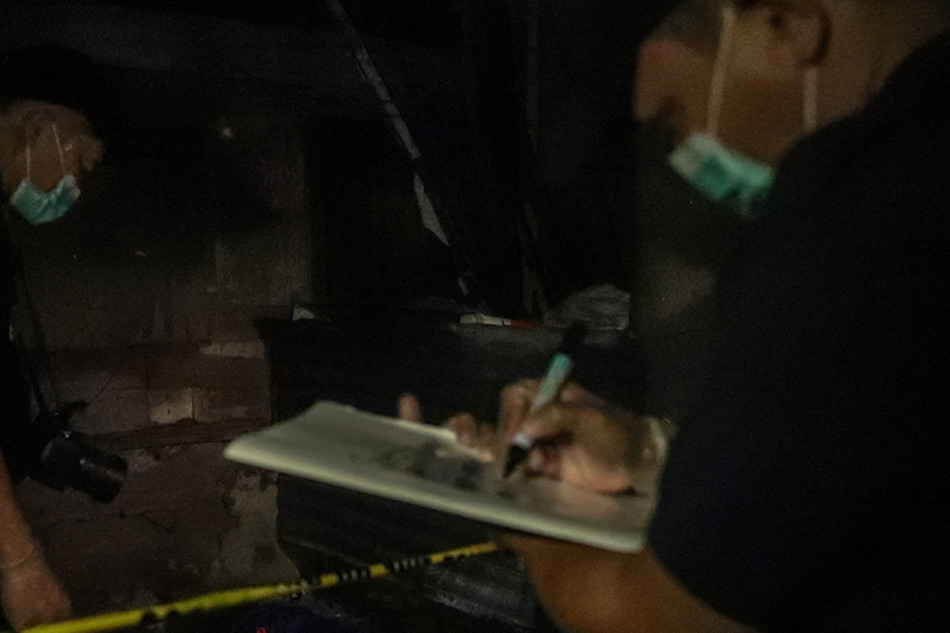
THE residents of a four-storey apartment located on Cristobal Street in Sampaloc, Manila were already in bed when they heard gunshots a few hours before midnight on July 27.
A few hours later, they would realize that another resident named Antonio Capuli, a policeman possibly in his mid-30s, was killed in what had been a buy-bust operation by his fellow police officers. Capuli had gone on leave from the Special Action Force without official permission from his superiors after he was arrested for illegal possession of marijuana.
The police operation surprised even the barangay officials. Eduardo Pineda, barangay secretary general, said the police gave no prior advice of the raid.
When the policemen came, they blocked the streets and instructed the residents to stay inside their houses, but still left them clueless and anxious about what they were up to at all, he said.
They came in droves, said Bobby Ramos, a retired policeman-turned barangay official, calling the police operation an “overkill” that disrupted the peace in the neighborhood.
Capuli was not a native of the area, but they were certain he was a drug pusher. He had been a renting a unit in the building for a month, according to Ereneo, another tenant.
Another neighbor said Capuli was a helper of a certain Stephanie, the one paying for the room.
Capuli belonged to a family of vegetable vendors based in a nearby barangay. - Juni Gonzales
‘He needed it to make both ends meet’

“MA, nandito lang ako sa kulungan.”
It was around 2 am of July 14 when she received the text message from her husband, Reynaldo Cruz. She was at their house in Barangay Mercado, Hagonoy, Bulacan.
“Kulungan” was sort of a codename where Cruz was to meet “commander,” supposedly a police officer, her husband’s boss, because he had been working for him as his informant—or “asset.” She had no idea it would be his last and that he would die in a buy-bust operation.
It was the third time Cruz met with “commander”. He left home at around 11 in the evening, she said.
Cruz was a tricycle driver and part-time carpenter. And he had some 10 ten people heavily relying on him--his wife, their five children, a son’s children and his in-laws. The money he earned as a driver couldn’t be enough.
That was when he was introduced into the world of prohibited drugs by no less than a friend named Rolando Viray. Cruz was too kind to lend his tricycle for the illegal transactions—and too vulnerable because he was in dire need to fend for his family.
Through it all, Cruz was wearing another hat: He was telling the commander “who’s who” in the underground trade in Hagonoy.
Cruz’s wife didn’t pay much attention to her husband’s text message. The next thing she knew, her 18-year-old daughter was in panic, saying she got a call from her father: “Ako’y may tama na, apat na.”
Cruz died in a police anti-drug operation, mother and daughter would learn later.
A report said some Hagonoy police operatives got a tip on the illegal activities of Cruz and Viray, and they pursued it.
It was said that during the buy-bust, Viray pulled out a .38-caliber gun from his waist and drew it to the poseur-police buyer. Cruz likewise opened fire with a .22-caliber magnum. The operatives retaliated, killing the two instantly.
Cruz suffered four gunshot wounds—one in his left shoulder, another one in his chest, and one on each of his knees.
Viray and Cruz were listed in a drug watch list of Hagonoy, the report added.
The police reported that they took from Cruz an Astra .22-caliber Magnum loaded with five ammunitions, and one empty cartridge, and some P400 cash, all to be used as evidence against him, police said. They also took his wrist watch.
The police got from Viray a .38-caliber Smith and Wesson loaded with three ammunitions, one plastic sachet of suspected shabu from his pocket, a packet of cigarettes, and P300 cash.
But while she admitted that he did errands for drug peddlers, Cruz’s wife said he was not a member of Bobsy Gang, a syndicate engaged in peddling prohibited drugs in Hagonoy.
She knew it, she said, because she confronted him once about it when she thought all these extra-curricular activities meant he had another woman in his life.
Not wanting to spoil the marriage, he confided to her, she said, that he was working as police asset. His commander, by the way, was the one who informed her of his death, she said.
She would be told later that the commander had died, too. But she refused to believe it.
The wife has since felt forsaken, burdened by the family’s financial woes. - Yssa Espanola, Juni Gonzales, Kimpoy Abacan
‘They didn’t care about their target’s family’

IT WAS a scene straight out of an action movie.
When the police spotted him in Barangay Marulas, Valenzuela City, 29-year-old drug suspect Danilo Dacutana ran for his freedom into the labyrinth of shanties a couple of hours before midnight last July 14.
He ran and jumped, squeezed his body swiftly through a window, climbed houses and landed on a roof—like he were “Spiderman.” Nonetheless, the police gave a chase. The bystanders were holding their breath from shock.
All this time, Dacutana’s live-in girlfriend, 23-year-old Juvy Banogbanog, was crying profusely, wondering why he was running and why the police wanted to collar him.
The chase turned full circle. Dacutana, known in the neighborhood as “Kalbo”, came back to his house and tried to hide himself in the toilet. Seeing a pursuing policeman, he opened fire using a .38-caliber revolver. It was not certain if he hit the target. But more policemen came and fired back. Dacutana fell down.
A television news video showed the police carrying him into the police’s service vehicle that brought him to the hospital. He was pronounced dead on arrival.
It was not the first time the police tried to collar Dacutana, his girlfriend Banogbanog said.
Days before, a group of policemen raided the house, but nobody was home. No shabu was found, either. But the raiders got their cell phones and some P5,000.
The police left a warning, a neighbor said. “Nung unang raid, pasok po dito ng mga pulis, sabi ‘pag nahuli ko si Kalbo,’ parang nagbanta daw ho. Papatayin na daw nila.”
A report from the Valenzuela City police said Dacutana had been the subject of a “one-time, big-time” anti-crime operation. He was on the station’s drug watch list, but when policemen went to his house, instead of surrendering, he immediately tried to escape, the report said.
They confiscated his gun and three sachets of suspected shabu, the report said.
But his girlfriend Banogbanog refused to believe Dacutana engaged the police in a gunfight. “Nabalitaan ko na lang po sa TV, sabi .38 daw po. Wala namang ganun yung asawa ko.”
Dacutana was wearing boxer shorts that night, so it was impossible for him to carry a gun, she said.
Banogbanog said he was a construction worker. He was a drug pusher, she said, but not a user.
He had been so since April, she said, but stopped when Davao City Mayor Rodrigo Duterte was sworn into the presidency.
“Sinasabihan ko rin po siya na, ‘tumigil ka na kasi nga kawawa naman kami kung sakaling maano ka, paano naman kami’ ganon. Tumigil naman po siya, mga dalawang linggo o isang linggo siyang tumigil,” she said.
Dacutana left behind her girlfriend with three children aged 6, 4 and 2.
They’re leaving the house to start anew, she said. But she is also looking for a job. “Kahit po ano—‘yung tagabantay lang po ng bata, kahit stay-in, ok lang po. O kaya po yung tagatinda ng mga damit, saleslady,” she said.
She is 23 and now feels the weight of raising a family all by her lonesome. It would have been a different story had the police given her boyfriend a second chance instead.
“Siyempre alam naman po nilang may pamilya siya. ‘Yun lang po.” – John de Lima, Jhoanna Ballaran, Ana Maria Reyes
‘He changed his ways, they killed him’
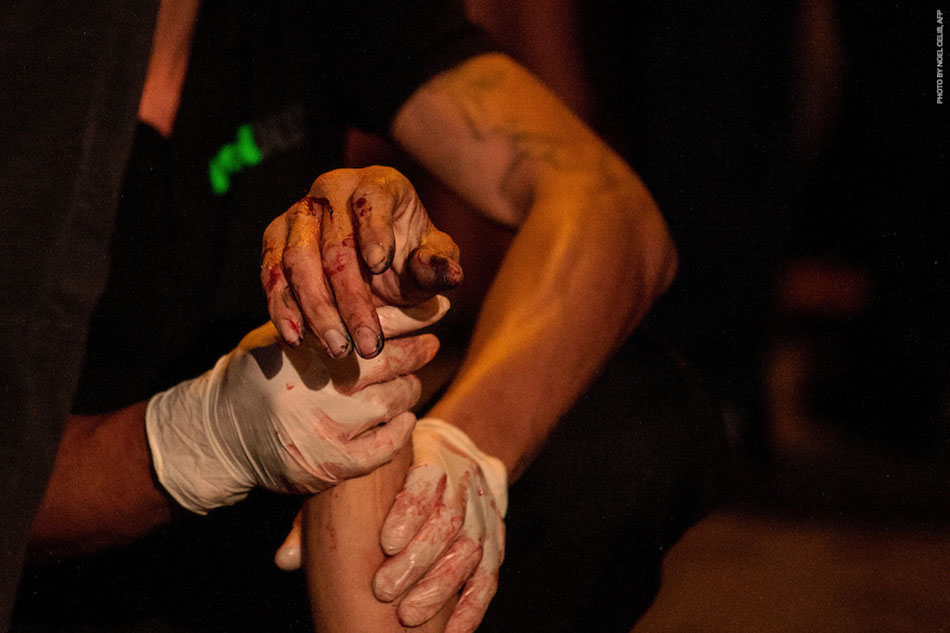
HE had been in and out of detention the past many years, all for theft.
After his release the last time on May 31, Diosdado Cestina Jr. went back to his family in Cabuyao, Laguna and promised--to himself and to his family--he would change his ways. He would likewise stop using drugs.
He was not getting any younger. And at 38, he wanted to help his family make both ends meet, this time. Zenkie, as he was fondly called, wanted to break free from his past.
And they believed him.
It was thus a great surprise when his three brothers and a sister-in-law received word he’s dead; his body found in a funeral home in Calamba City on June 18. It had gunshot wounds in the upper abdomen.
A police report showed that Cestina was gunned down by a team of operatives in a buy-bust operation in a subdivision in Cabuyao City that turned bloody. He resisted arrest, exchanged fire with the police and was killed.
Police said they recovered from Cestina a .45-caliber pistol and two sachets of suspected shabu.
Cestina’s sister-in-law Jona called the police story a tall tale. As far as she knew, she said, Cestina had stopped using drugs since he came out of prison. And he was never a pusher, she said.
“Nagtataka po kami bakit may baril,” she said.
Cestina found work as a construction worker. “Pagkagaling sa trabaho, dito lang sa bahay,” she said.
On that fateful afternoon, he and his brother were supposed to buy food at a market and go straight home, but he changed his mind, excused himself and instead went somewhere else.
Nobody knew where he went, but that short trip elsewhere couldn’t help convince Jona he fought it out with the police.
To date, Jona said the family still could not make sense of the things that could have led to Cestina’s death. “Pag nasa bahay na, tulog agad siya,” she said.
Jona refused to ask questions now because, she said, more questions led to more questions than answers. Their problem now, she said, has been compounded since they borrowed money to give him a final resting place.
“Mabait naman po ‘yun eh,” she said. “Nagbabago na nga. Ewan kung bakit ganun ang nangyari.” – John de Lima, Rachel Cantuba, Juni Gonzales
‘They knew he’s a pusher, they called him Jond Doe?’

THERE WAS a man who left his wife and four children in Isabela and traveled to Biñan City, Laguna sometime in May to visit his father who had suffered a stroke.
On his third day in Barangay Malaban in Biñan, the man was gunned down in an operation the police called “Oplan Lambat Sibat”, an anti-crime campaign launched during the Aquino administration.
The operatives were certain that Juvida had been peddling drugs, but could only identify him as “Jond Doe” as stated in a Biñan police report dated May 20.
The police report gave no other details about the man, except to say that he resisted arrest when the operatives tried to catch him selling drugs and that he fired upon the police using a shotgun. The day had just begun, it was a little past dawn, about 6am.
His body spread on the floor, the dead man--the police made their findings known--was the right-hand man of a notorious drug pusher in Biñan they did not identify, possibly still at large.
The police report identified another slain suspect. He was Arnel Edeza, a 20-year-old man the police identified as the older man’s errand boy.
It was possibly because of Edeza, a native of Biñan, that the residents made heads and tails of the killings. Edeza was supposedly the caretaker of a small lot where the older man raised fighting cocks. The older man was later identified as D Loyd Juvida, a 29-year-old native of Isabela.
Juvida and wife ran a small business in Isabela.
The police report said the investigators found a 12-gauge shotgun and a .38-caliber revolver from Juvida and Edeza, respectively.
They also found some shabu, a digital weighing scale, drug paraphernalia and undetermined cash.
The relatives of the dead, however, had serious doubts about the police’s story.
Juvida’s aunt Nerissa Cariaga said she could not believe Juvida had a shotgun.
“Paano lalaban yun, wala naman hong armas yon,” Cariaga asked. “Kakagaling lang ‘nun ng Isabela. Saan manggagaling ang shotgun nun para lumaban sa kanila?”
Edeza’s father Arturo had similar lament. “Ni hindi nga marunong humawak ng baril ‘yung anak ko eh,” he said. Edeza was one of his seven children.
Arturo last saw his son two days before he died, he said. Edeza had told him he was off to look after
Juvida’s rooster, he said. “Paalam nga niya sakin, ‘baka hindi niyo na rin ako makita,’ nung May 18,”
he said.
At least seven policemen dealt with Juvida and Edeza inside the house, Cariaga said, while some others were outside. All of them were in black; their faces covered.
Cariaga had no copy of Juvida’s death certificate, but she said his face was deformed when she checked his body at the funeral parlor. “‘Pag naaalala ko hitsura ng pamangkin ko, hindi maaaring hindi mapaiyak,” she said. “Naawa ako sa hitsura.”
Edeza suffered gunshot wounds in the trunk, his death certificate showed.
“Masakit,” Cariaga said. “Pwede namang hulihin, pero hindi para ganunin ang pagkamatay. Nakakaawa.”
If they had the means, Cariaga and Arturo said they would have sought legal help if only to ferret out the truth about the death of their relatives. But they couldn’t, they said, for fear that one day the police might target them, too. – John de Lima, Fernando Cabigao Jr.
‘They killed him before Oplan Tokhang’
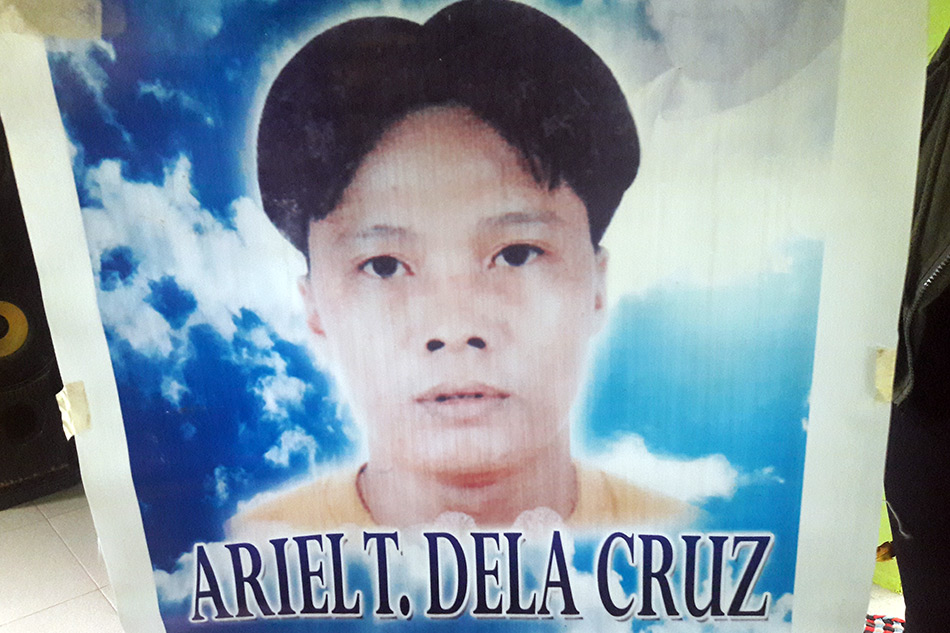
ARIEL dela Cruz was once hooked on drugs.
With the help of his family who owned a rice field in Basuit, San Ildefonso, Bulacan, the 35-year-old farm worker quietly stopped.
It had been a year since then.
“Gumamit sya,” his mother Adelina said. “E matagal na, noong nakaraang taon pa.”
But when Davao City Mayor Rodrigo Duterte asked all people on drugs to surrender to authorities during the presidential campaign, dela Cruz did so at once.
He had no criminal record, and “Oplan Tokhang” was not yet a household name. But he wanted to have a clean bill of health, so to speak; then, privately and now, publicly.
“Sumuko siya sa barangay,” Adelina told ABS-CBN News. “Dinala po sya sa San Ildefonso gym. Pinatawag po lahat ng mga pinasusuko, mga June siguro, kasi kasagsagan pa yun ng request ni (Mayor Duterte)na sumuko eh.”
It was thus unbelievable for Adelina that the family would receive news one day in July that dela Cruz was dead on suspicions that he was still on drugs.
To Adelina, the news of her son’s death was so painful. But the sight of his body was worst: He was shot nine times, all the bullets landing in his torso.
“Yung pangyayari na yun, may nakakita, may sumusunod [kay Ariel] na (motorcycle), dalawa raw ang sakay, na oras daw na dumating doon sa sementado, e binaril na,” she said.
A subsequent police report said it was a buy-bust operation—-that familiar story: the suspect fired at the police, prompting the police to shoot him.
The report said the investigators found in the crime scene a .38-caliber revolver loaded with five ammunition and a cartridge case, ammunition for .38-caliber, two plastic sachets of suspected shabu, a cellphone, a lighter, and the P500 marked money.
That report was ridiculous, Adelina said.
“Isipin mo, wala namang dalang baril yun, e nung datnan nila ay may baril daw na nakasuksok dito at nakunan ng limang daang piso saka raw dalawang sachet ng shabu,” she said.
Dela Cruz’s brother-in-law Robert Evardo said the family had serious doubt of the alleged pieces of evidence. “Paano siya nagkaron ng baril sa bulsa? Eh samantalang dito P20 lang po ang dala nyang pang gasolina,” he said.
To date, Adelina, now 71, still mourns her son’s death. It is painful to lose and bury one’s parents, she said.
But it is even more painful for a mother to lose and bury her child.
“Napakasakit,” she said. “Talagang napakasakit. Ako, patay na ang magulang ko. Pero iba pala yung anak, pag namatayan ka ng anak.” -Kimpoy Abacan, Rachel Cantuba, Yssa Española
`I won’t resist arrest’
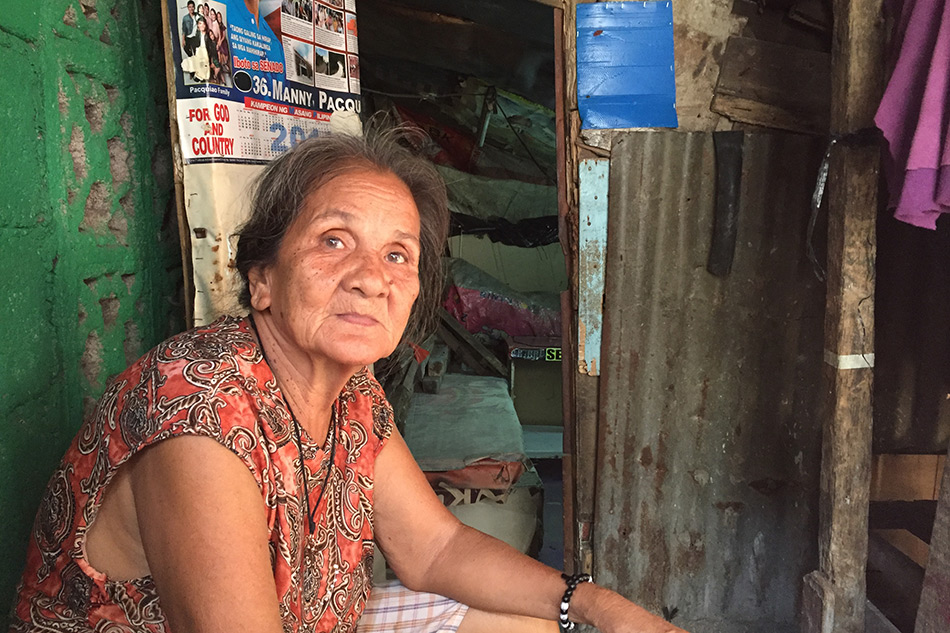
NANAY Rosario was awakened by the sound of gunshots in the early hours of June 24. She ran down the stairs and found her son Rodelio lifeless.
A police report dated June 24, 2016 said Rodelio alias “Kulot” was ranked first in the barangay’s drug watch list. He had previously been involved in a robbery-snatching incident nearby.
Just before he was killed, the Meycauayan Police Station conducted a buy-bust operation, the police report said.
But Rodelio sensed he was transacting with a police officer, so he ran back to his house. A police chase ensued. He grabbed a caliber-38 revolver and fired at the poseur buyer. Police operatives retaliated, resulting in Rodelio's death.
But people who were there that day had a different story to tell.
Rodelio, they said, was at home with another person when men in plain clothes wearing masks barged inside the two square meter room. Rodelio’s companion scampered off. There was silence, until four gunshots erupted. The men in masks ran out, and then policemen in uniform arrived.
"Yung anak ko narinig 'Hindi ako lalaban'. Tapos pumutok na. Umaray na. Sumigaw 'Aray'. Tapos putok ulit," said Rodelio’s brother Rogelio.
Nanay Rosario and Rogelio admitted Rodelio was involved in illegal drugs.
“Inaamin naman talaga namin na nagpapagamit siya diyan. Hindi naman siya yung totally pusher. Halimbawa kapag may gagamit… Ang balita ko diyan, sampumpiso yata. Parang papwesto lang," Rogelio said.
But they both denied Rodelio owned a gun.
“Duwag yan eh," Nanay Rosario insisted. “Sinungaling yung mga pulis.”
Rodelio left behind three daughters aged 25, 22 and 17. He was estranged from their mother. – Ana Maria Reyes
Kung drug dealer yan, dapat may pera yung asawa.’
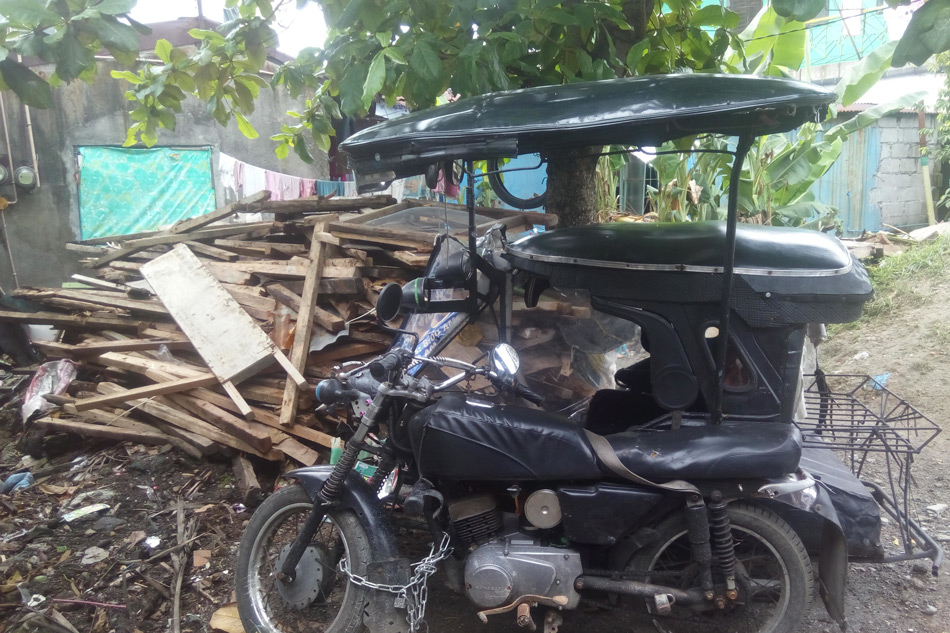
FOUR days after he celebrated his 44th birthday on July 17, Florentino Santos was killed in a drug buy-bust operation conducted by the Guiguinto Police in Bulacan.
His relatives rushed to the police station. But no one could answer their questions.
“Sabi [ko] nga nasaan kako yung mga nag-conduct noon? Nasa labas daw. E hindi na namin hinintay kasi ang pangit na ng mga salita nila,” said an uncle who refused to be named for fear of reprisal.
Relatives proceeded to the funeral parlor. They were horrified to learn about the state of Florentino’s remains.
“Kausap ko yung embalsamador. Tinanong ko kung ilan ang butas. Sampu, sabi. Dito, puro dito [dibdib]. Kinuwento pa nga ng embalsamador na tinahi daw niya yung puso kasi panay ang dugo.Talagang overkill, “ he said.
His uncle was also certain that Florentino did not own a gun. “Naku, ni baril de tubig wala.”
Florentino’s family said that he was indeed using illegal drugs, but denied he was a drug dealer.
“Kung bumili ng bigas sa akin 'yan kalahating kilo magsasaing, tapos uutang pa ng de lata, pagbalik noon sa gabi babayaran. Tapos ide-declare na drug dealer?” Florentino’s uncle said in disbelief.
His kin also narrated how difficult it was to pool together money needed to pay for Florentino’s funeral. “Ito na nga ang masakit, hindi namin makukuha yung bangkay kaya noong madaling araw, nagising lahat[at] naglikom ng pera. Tingnan mo nga 'yon. Eh kung 'yan ay drug dealer, dapat may pera yung asawa.”
Among three siblings, Florentino was given the task of caring for his mother who has Alzheimer’s disease. He would feed and bathe her, and wash her clothes. The mother continues to look for him despite being told that he had died.
Florentino’s three children are still in school. His wife and eldest daughter will now carry the burden of providing for the family. - Rizza Cervantes, Rachel Cantuba, Fernando Cabigao Jr.
‘Is this any way to arrest a suspect?’
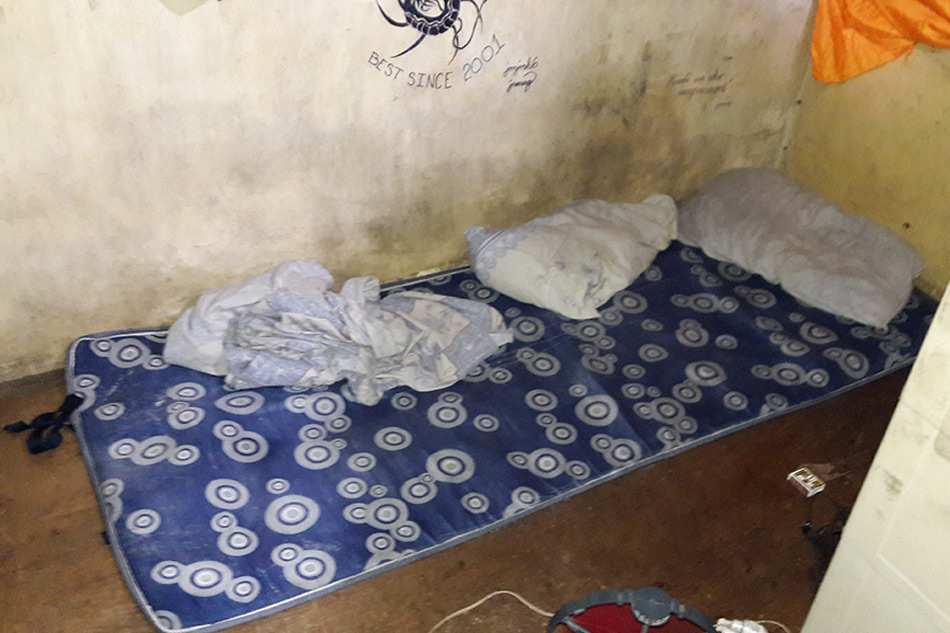
JESSIE BOY Narag was wanted by the police for a robbery on July 14 at around 1am in Balut, Tondo.
In less than 24 hours, seven heavily armed men wearing masks stormed his house in Permanent Housing, Barangay 128, in Balut, Tondo, Manila, looking for him, shouting and shoving everybody who got in the way, including Narag’s mother and older brother.
Narag’s brother asked for the warrant.
But one of the men smacked him in the face instead. Shocked, confused, the mother told them Narag was upstairs sleeping.
The 23-year-old Narag was in deep sleep. He had gone to bed early, tired helping his older brother in fixing a neighbor’s television set.
“Labas, labas!” Narag’s mother heard one of the men shouting. “Bakit po kayo ganyan sir, ano po bang problema?” she asked, trying to block the men. “Di kayo pwedeng pumasok sir, ako na lang hulihin niyo.”
One of them grabbed her by the arm, another one by her other arm, both forcibly dragging her out of the room. She struggled to break free, but in vain. She begged the men: please stop; her two grandchildren sleeping in the living room might get hurt.
“Diyan ka, diyan ka lang ha!,” a man replied. “Pag kumawala yan, barilin, posasan!” The other man pushed her into the terrace.
Narag’s brother was seized next, held by another man by his neck, followed by his pregnant wife.
The mother became hysterical. She asked the men to arrest her son if he did anything wrong; She would surrender him to the authorities. Just do not hurt him, she said.
Her husband, a stroke patient, later emerged from his room carried by two other men. To keep them all at the terrace, two men stood by pointing their guns. They were all red and fidgety.
The children, Narag’s mother would find out later, remained inside the house. But one of the men woke up the nine-year-old and asked her to carry her four-year-old cousin outside. They ran across the house owned by an aunt.
About 30 policemen in uniform had crammed the building’s second floor, guarding each door to prevent the residents from prying. Everything stood still at the cramped and dense tenement.
Gunshots echoed later through the building. Narag was dead.
“Bakit niyo naman pinatay?” the mother asked. “Susuko naman yung anak ko. Lalaban ba yon natutulog? Nakahiga pa nga yon e.”
Narag suffered from multiple gunshot wounds, according to the Manila police report and the death certificate issued by the funeral service.
Narag was dead, but in two police reports, authorities identified him as Jonathan, a name held by his elder brother. One report was prepared by the Raxabago-Bago Tondo police station, the other was prepared by the Criminal Investigation and Detection of the Manila Police headquarters on UN Avenue. Both reports were dated July 15.
Both reports said Narag was killed as a result of the follow-up operation from a robbery incident and that the authorities recovered from him a .45-caliber gun, a homemade shotgun or sumpak, a pen gun, and five sachets of suspected methamphetamine hydrochloride also known as shabu. He was also a pusher, the two reports said.
News reports showed Narag dead, on his bed, holding a gun in his right hand. His mother said her son was left-handed.
“Malayong mangyari e,” she said. “Hahawak lang ng kutsara anak ko sa kanang kamay nahuhulog e. Yun pa kaya hahawak ng kanan?”
While she admitted her son was a drug user, she told ABS-CBN News it was impossible for Narag to own a gun.
“Wala namang baril ang anak ko kasi wala naman kaming pambili no’n,” she said. - Jhoanna Ballaran, Rachel Cantuba
'Hindi baril ni Celso yun. Kinuha yun sa bag ng pulis.'

CELSO GUITES was struggling to begin a new life.
Having served time in jail three times before over the sale of illegal drugs, this time around, the 42-year-old man was determined to change.
Just recently he surrendered to authorities after they did the rounds of the neighbourhood in what’s known as “Oplan Tokhang”. He stopped selling shabu, but had difficulty kicking his own addiction to the drug.
On the morning of July 16, he sat on the doorstep with a cup of hot coffee. No one knows what he set out to do that day, but in just a matter of minutes, he was dead.
Everything happened quickly, said a friend who was in Celso’s house that day. She asked to be called Lina to conceal her identity for fear of reprisal.
Five men from the Airport Police Community Precinct and the Barangay arrived and dragged Celso back inside the house. They asked everyone else to go upstairs. Lina hid behind the stairs and saw him kneeling on the floor. A gun was pointed at him, she said. She heard Celso begging for his life.
The policemen then staged a commotion to make it appear as though Celso had become unruly, Lina said. She saw police hand him a gun, but he refused it.
With both Celso’s hands raised, she saw policemen shoot him. "Talagang ginawa nilang baboy yung tao. Parang hayop na pinatay nila."
When the police report became available, it said Celso resisted arrest and tried to fire at policemen. It also said a .45-caliber pistol loaded with live ammunition was recovered at the scene, as well as six sachets of suspected shabu, three sheets of aluminium foil, a disposable lighter and PhP200.00 in cash.
"Yung baril inilagay nila sa ilalim ng dugo. Kinuha nila yun sa bag na itim na dala -dala ng mga pulis. Hindi baril ni Celso yun. Tapos may kinalat sila dito na sachet, para kunwari siguro sa kanya," Lina recalled.
Celso is survived by seven children. - Yssa Espanola, Jhoanna Ballaran, John de Lima
'Lumaban daw pero walang pinapalo yon, kahit mga bata'
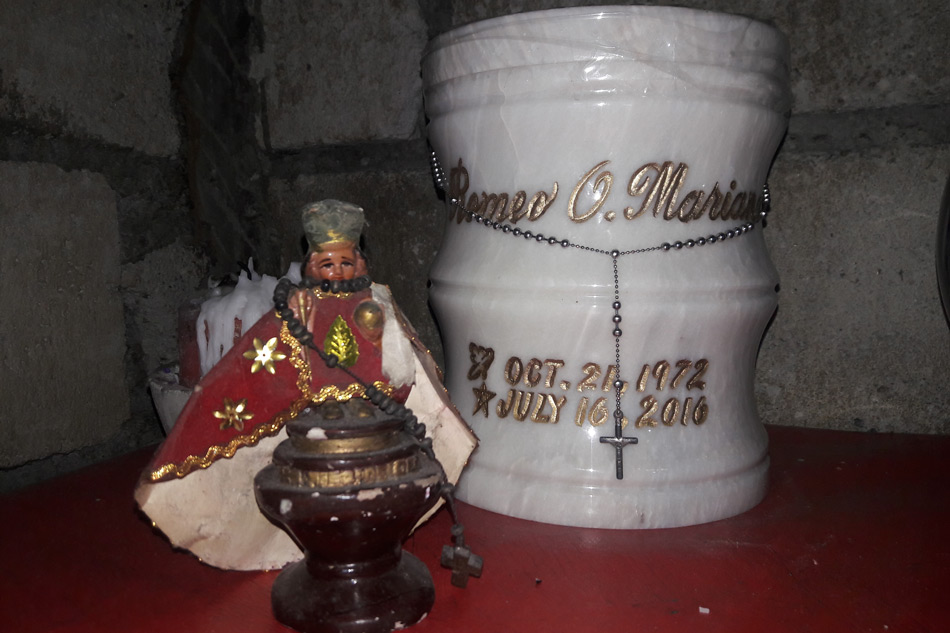
WHEN Romeo Mariano became a barker for a jeepney terminal in Caloocan, he left his children to live at the family compound while he rented a room in a house to be closer to work.
But it came at a price.
The house was a drug den, and it wasn’t long before he started to use shabu.
On July 16, when Romeo’s 22-year-old son, Prince, arrived home from work, he was told by a family friend that his father had been killed in a shoot-out with policemen.
Prince could not bear to visit the crime scene, so his 15-year-old sister Romelyn went instead.
A police report said Romeo was caught in the act of selling drugs in Sta. Quiteria, Caloocan. He was shot after he engaged policemen in a gunfight while trying to escape.
“Yung mga pulis, sabi lumaban daw yung Papa ko. Dito nga samin miski-isa, walang pinapalo yon, kahit mga bata,” Prince said.
Although Prince did not live with Romeo, he was certain his father did not own a gun.
Prince and Romelyn grew up without a mother and were raised by their grandmother. Romeo’s death has left Prince with the difficult task of providing for the family.
“Ang sakit, sobra.” Prince said. “Lalo na para sa akin, sa lola ko, lalo sa kapatid ko. Close na close sila ni Papa.” - Rachel Cantuba
'Ang tao ba, wala nang karapatang magbago?'

Joel Parungao had barely savored his freedom when he was shot dead.
He had spent time in jail over drug charges in the past, according to his ex-girlfriend Annabelle.
But on June 20, Joel became one of three men who were killed in a buy-bust operation in San Mateo, Rizal. Four others were arrested.
A police report narrated how one of the suspects opened fire at authorities, which escalated to a shootout. Annabelle found this difficult to believe. “Kung nanlaban ka, bakit ang tama mo nasa sentido?”
Annabelle said Joel was a “big-time drug pusher” in the 1990s. But the long arm of the law caught up with him, and he was detained in 2002, leaving Annabelle to raise their two young children. Then, Annabelle too turned to drug dealing, until she ended up in jail in 2004. The children were uprooted to live with relatives, one sent to Isabela and the other to Bulacan.
Annabelle was released from detention in 2009, and Joel, in 2010. But the family would not be reunited for long. In August 2015, Joel was arrested again. By the time he was released from prison seven months later, Annabelle had found a new lover. Joel ended up living in the house of Ruel Avila, an old friend whom police alleged was a drug pusher.
Annabelle warned Joel to stay away from Avila. “Yung bahay, pwestuhan talaga yun. Kumbaga may bibili at para makalibre yung may-ari ng bahay, duon niya pinapapwesto yung mga kaibigan nya,” she said.
News of Joel’s death came through a stream of text messages after relatives saw the story on television.
Until then, Annabelle had never lost hope that Joel could still change, just as she did. “Bakit, ang tao ba, wala nang karapatang magbago? Porke’t nahuli ninyo ako ng ganun, ilang taon na ang nakalipas, ganun pa rin ba ang tingin nyo sa akin?” - Kimpoy Abacan, Jhoanna Ballaran, and Ana Maria Reyes
'Omeng, lumaban ka!'
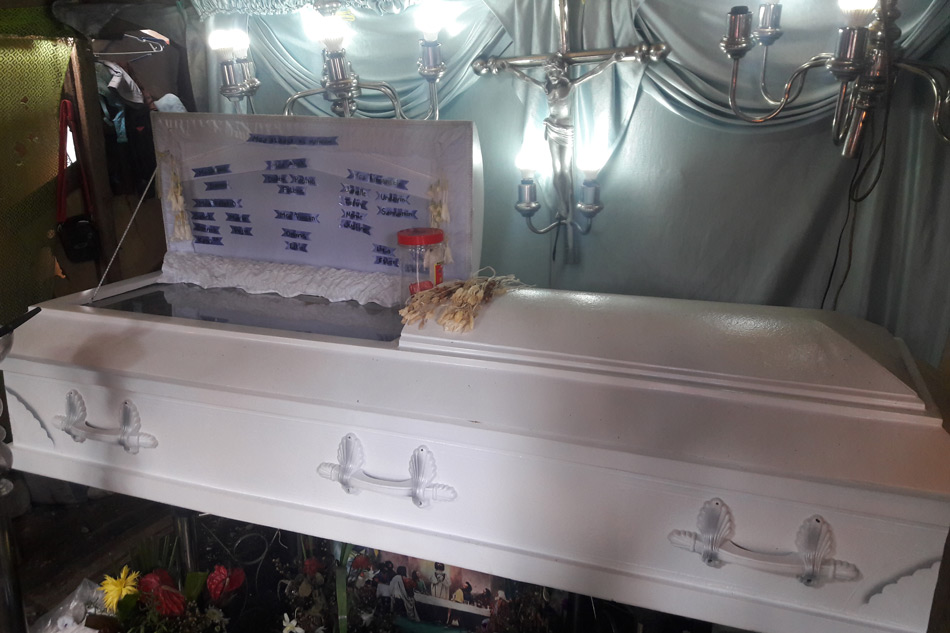
Estrelita Patagoc had seen many things in her lifetime. But on July 24, the 67-year-old saw the unthinkable, as policemen shot her grandson Rommel right in their own home.
Police arrived in Barangay Tumana looking for Rommel “Omeng” Parsaligan. He was in the Barangay’s drug watch list, and so was his mother, Lester.
But police were only interested in Rommel that day. Lester was sent out of the house. Estrelita, who suffered a stroke last year and had difficulty moving about, was left in the house with her grandson.
It was there that she witnessed how he was shot and left to die.
“Omeng lumaban ka!”Estrelita said to her grandson who was sprawled on the floor. She had difficulty speaking, but pleaded with policemen to bring Rommel to the hospital. They didn’t listen. “Dumating yung paramedic, wala, patay na,” she said.
The police report said the Anti-Illegal Drug Special Operations Task Group of the Marikina City Police Station conducted a buy-bust operation targeting Rommel. The poseur-buyer successfully purchased a sachet of shabu. But Rommel resisted arrest, the report said, and engaged in a shootout with policemen, resulting to his death. Estrelita insisted Rommel did not own a gun.
While Estrelita will remember her grandson as a good person who took care of her and bought her medicine, his cousin Jonah lamented that Rommel turned to dealing drugs because work as a Pedi cab driver and construction worker could never be enough to support three children. – Ana Maria Reyes, Fernando Cabigao, Rachel Cantuba
'Paano makakapang-agaw ang naka-posas?'

AURORA Dizon lost two sons in one evening.
It all began when 34 year old Rolando Jr. was arrested for playing “Cara y Cruz” at a neighbor’s wake in Barangay Tunasan, Muntinlupa on July 5. He and two companions were herded into a police vehicle.
When Aurora heard the news, she hailed a tricycle and tailed them. But the vehicle turned back and headed straight for the Dizons’ home. Later Aurora would find out that a police asset pointed to one her sons, Julius, as the one involved in illegal drugs that’s why the police car went to their house.
Aurora watched helplessly as two policemen barged inside the house without a warrant. A third policeman waited outside. They all wore black. One of them wore a ski mask.
She was told by policemen that sachets of substance suspected to be shabu were discovered in their house. Police handcuffed her 25-year-old son Julius and youngest son, Archie.
“Sir, masakit na ho, sobrang sikip ng posas ko, luwagan nyo naman,” Aurora heard Julius say. The policeman told him to keep quiet. It was the last time she would see him alive.
There were five men inside the police mobile—the three Dizon brothers and two others arrested during the card game.
But Archie and the two others were released along the way. Rolando and Julius remained in custody.
When Archie hesitated to part with his brothers, a policeman admonished him. “O anong ginagawa mo pa diyan, umalis ka na. Gusto mo pa din bang madamay?,” Archie recalled the policeman asking. Archie would have wanted to tail the van, but had no money.
When Aurora arrived at the Ospital ng Muntinlupa, she was devastated to find Rolando had been pronounced dead on arrival at 3:55am.
She could only hope Julius was still be alive. She rushed to the Royalty Funeral Homes in Las Pinas City, only to find the remains of Julius also there.
Aurora learned from the hospital staff and death certificate of Julius that the brothers died about thirty minutes apart due to gunshot wounds in the head and chest.
Their sister Catheren Arnaiz denied Julius was involved in illegal drugs.
“Yung kapatid kong sumunod sakin [Rolando] talagang involved siya sa ganun [illegal drugs],” Arnaiz said. “Pero yung Julius talagang wala kasi may trabaho siya.”
She also doubts that her brothers resisted arrest as police claim.
“Paano po nila mapagtutulungan eh naka-posas po. Yung kapatid ko [Rolando], ang posas niya dalawa, ekis,” Aranaiz said. “Tapos yung isa kong kapatid [Julius], pinosas din nila [yung] dalawang kamay, paano siya makakapang-agaw? ” Arnaiz asked.
The Dizon family would have wanted to file a case, but justice is a luxury they cannot afford. – Rachel Cantuba, Juni Gonzales, John de Lima
“Gusto ko lang, tamang proseso, tamang parusa”
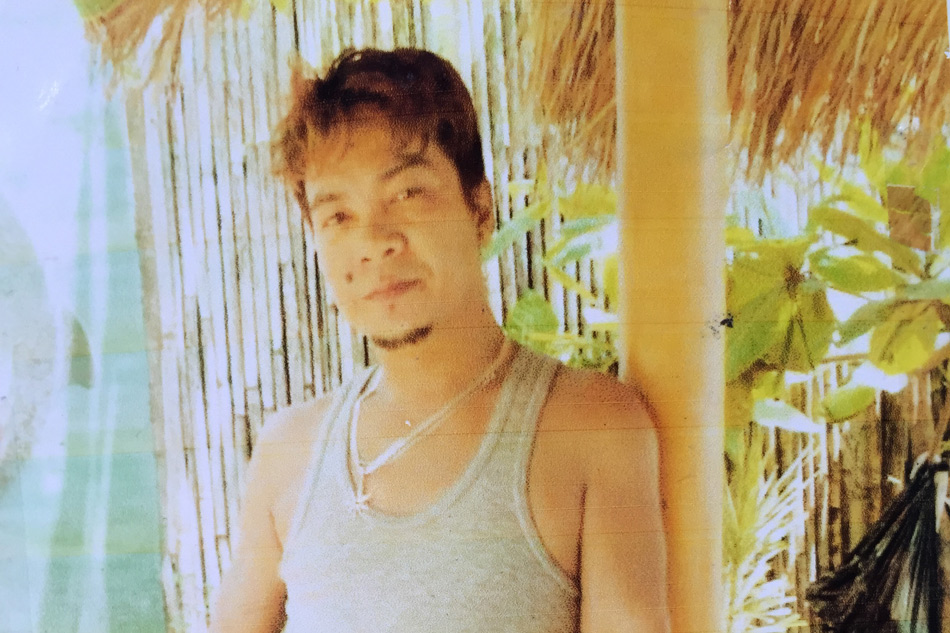
Henry Fransisco knew life in the slammer.
He had already been jailed in 2015 over illegal drugs, and was lucky to be out on bail.
But it wasn’t long before his luck ran out. A police report said Intelligence operatives of the Valenzuela Police conducted a drug buy-bust operation on the evening of July 21, 2016. When he sensed he was dealing with an undercover agent, he drew his firearm, which prompted policemen to fire back. Henry was killed in the shoot-out.
When Henry’s mother Cristy heard the news, she immediately went to his apartment. Henry’s body was not there anymore but the neighbors told her what they saw.
Cristy said neighbors’ accounts contest the police report dated July 21, 2016.
There was no buy-bust operation, the neighbors told her. Instead, men in plain clothes simply turned up at Henry’s apartment, kicked the door open, and shot him dead as he lay in bed.
Cristy laments that they had to kill him when they simply could have taken him back to jail. He had already surrendered to authorities following the Oplan Tokhang, but the police operation was conducted before he could complete the registration process.
"Ang anak ko mabait, magalang. Kaya lang talagang naligaw ng landas. Hindi ako ipokrita. Talagang ang anak ko nagkasala sa batas. Ang gusto ko lang sana, yung tamang proseso, tamang parusa, hindi yung buhay ang kukunin," Cristy said.
The police report said shabu and one caliber-38 revolver were found in the crime scene, but Henry’s family said he did not own a gun.
His death leaves Cristy with the task of helping provide for four grandchildren, including a 15 year old with cerebral palsy. – Ana Maria Reyes, Jhoanna Ballaran and John de Lima.
‘He surrendered, and we thought everything was all right’
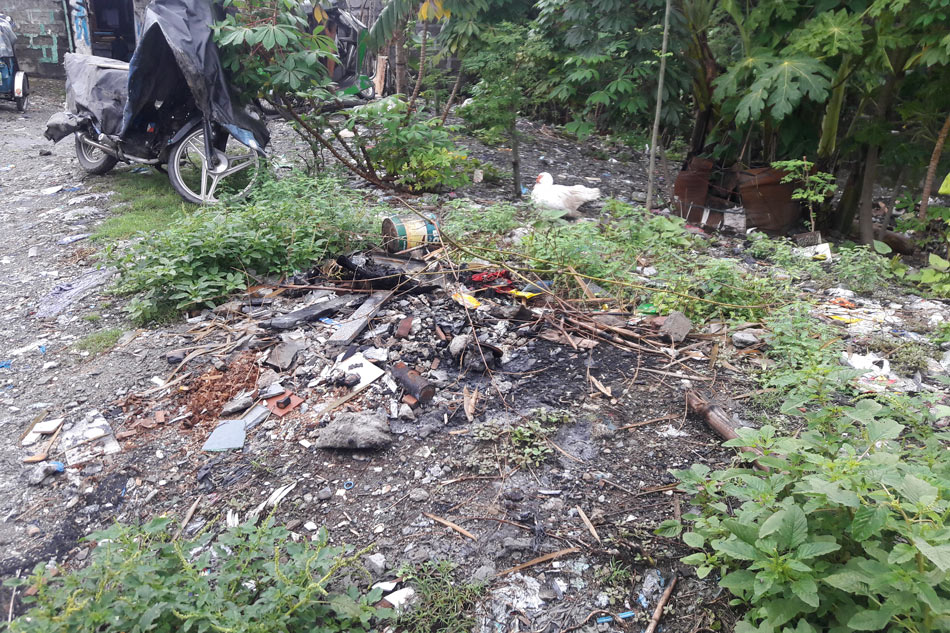
IN THE afternoon of July 14, construction worker Rico Estrella Desoasido surrendered to the police, according to his live-in girlfriend. Rico had been using prohibited drugs for over a year.
A few hours later, he went back home to Sitio Tibag III, Barangay Panapaan III in Bacoor City, Cavite.
“‘Ok na,' Wala nang problema kasi kausap ko na yung hepe,’” she quoted him as saying. “Sabi ko, ‘O ‘di magtatrabaho ka na?’ Sabi niya, ‘Papasok na ako.’”
She had encouraged Desoasido to turn himself in, like thousands of others did, since the government has been serious in its campaign against drugs.
And so on that day, he did so.
But hardly had he settled down for the night, Desoasido was shot at close range by the police a few meters away from his house.
A police report from Bacoor City Police Station said Desoasido was killed in a buy-bust operation that resulted in an encounter. Desoasido supposedly drew his gun after he realized he was transacting with policemen, who were fast enough to shoot him first. A .38-caliber revolver and three sachets of suspected shabu were found in his possession, the report said.
Desoasido’s girlfriend did not witness the killing, she said, because she was inside the house making brooms, which she sells for a living.
But after figuring out at some point that there was a commotion in the neighborhood, she left the house to check what was happening. She was surprised to see her boyfriend by the entrance of their compound, lying dead on the ground.
Other than these, she could not provide any more details about what happened.
But she found it unfair that the police would kill him hours after he surrendered. They were just a poor couple trying to get through too many difficulties in life, she said. – John de Lima, Rachel Cantuba, Juni Gon



